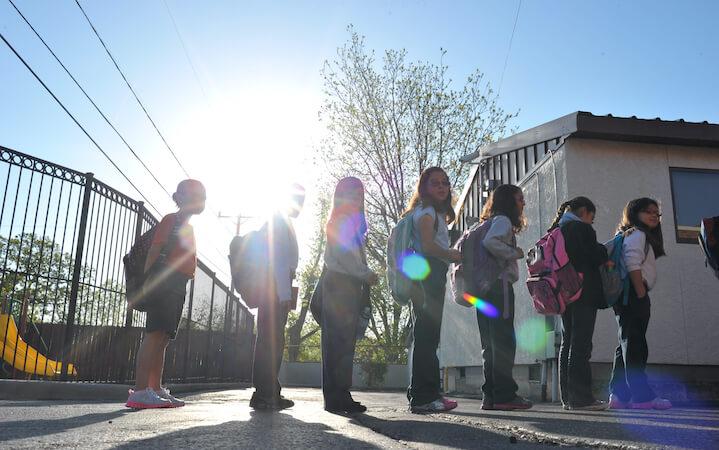Curiosity inspired me to apply to the Reform Leaders’ Summit. I loved school growing up, so much so that I wanted to become a teacher and have fond memories of all school related events.
 My sisters and I would fervently prep our school supplies the day before school started. Names appeared on notebooks, sharpened pencils populated our pencil pouches, freshly ironed uniforms floated from the basement into our rooms, and backpacks appeared from their summer hiatus. A sense of anticipation and excitement filled our living room, not only because next morning came with the promise of French toast, but also because my family loves school (most of the time) and learning.
My sisters and I would fervently prep our school supplies the day before school started. Names appeared on notebooks, sharpened pencils populated our pencil pouches, freshly ironed uniforms floated from the basement into our rooms, and backpacks appeared from their summer hiatus. A sense of anticipation and excitement filled our living room, not only because next morning came with the promise of French toast, but also because my family loves school (most of the time) and learning.
My parents sent my sisters and me to Catholic grade and high schools, a choice that aligned with my parents’ deep-seated belief that Catholic schools ensure that students can grapple with their faith in all aspects of the day and see how that faith animates the desire for justice. Increasingly, I realize the sacrifices and choices my parents made to send us all to Catholic school, and more generally, send us to a school they chose. I look back on my time in school with deep gratitude, and as a teacher now, I realize how hard my teachers were working to give students a high-quality, meaningful education. I also know that not every school in this country works for every student, but I want that to be true and I’m committing to make that true. Students deserve, and are entitled to, an education that honors their dignity by committing to excellence.
I knew the terms of the school-reform movement – parental choice, charter schools, vouchers – but I couldn’t see the whole picture of how they fit together. I wanted to learn more, all while being surrounded by people who were searching for ways to improve our education system, so that learning and schools spark joy for every student. More importantly, I wanted to know how to improve the quality of education for all students, and I wanted to know how to do it quickly. If typical reform takes 10 years to implement, how does that help a generation of students?
"I look back on my time in school with deep gratitude, and as a teacher now, I realize how hard my teachers were working to give students a high-quality, meaningful education."
Through the Reform Leaders’ Summit, we’ve had access to discussions with leading thinkers in the movement. My favorite was when Howard Fuller joined us and emphasized that access to high quality education for all is a civil-rights issue, which further underscored the need for immediacy. I think of the words of the Psalmist crying out in Psalm 130, “How long, O Lord? Will you forget me forever?” as I think of the continued impacts of structural and systemic racism in our country and in our education (public, private, and charter) system.
Because of the pandemic, in-person meetings were suspended for this year, but I especially valued the camaraderie that developed over Zoom. Teachers from across the country – New York, Louisiana, Texas, Colorado, Nevada, and California – fill the group. (If you’re curious, we actually haven’t struggled all that much to find a time conducive for all of us to meet, despite all four continental time zones that are represented in the group.) This geographic diversity allows me to contextualize national challenges in education – sometimes similar, sometimes not, such as our diverging challenges of reopening schools and our shared belief in the efficacy of instructional coaches. Through our conversations, data points often appear, and we interrogate the need for stronger schools in a national and local context.
"Students deserve high-quality schools. We need to ensure that families and students have some autonomy in choosing their schools."
Finally, I don’t think it will surprise anyone to hear that being a teacher (or student, or principal, or parent of a student) has been challenging this year. At the end of the day, this group helps me feel affirmed as I navigate teaching in a pandemic. I look forward to continuing these discussions further next year.
After the experience, I walked away with a simplified belief: Students deserve high-quality schools. We need to ensure that families and students have some autonomy in choosing their schools. We need to ensure that all teachers are being given the support and resources they need, a need made clear by the pandemic’s unjust impact on low-income communities and communities of color. We need to ensure that every student and family looks forward to the first day of school as much as my family did.
 Alliance for Catholic Education
Alliance for Catholic Education
